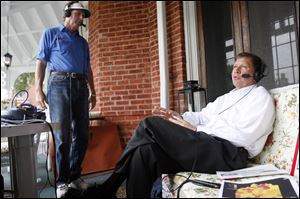
Kasich signs pledge not to increase taxes
6/6/2010
Republican gubernatorial nominee John Kasich, right, answers questions from radio host Rick Metz while campaigning at the Old West End Festival.
COLUMBUS - The Republican who has made repealing the income tax part of his platform in challenging Ohio Gov. Ted Strickland in November has signed a pledge saying he would oppose and veto any effort to raise taxes.
Former Congressman John Kasich signed the "taxpayer protection pledge" sponsored by the conservative Americans for Tax Reform. He also signed the pledge during his tenure in the U.S. House.
Mr. Kasich "knows that lower taxes are the key to creating jobs and reviving our economy," said campaign spokesman Rob Nichols. He said Mr. Kasich would offer a comprehensive plan to create jobs to generate tax revenue when balancing the next state budget. The state faces a potential multibillion-dollar deficit for the 2011 tax year.
Mr. Strickland never signed such a pledge and views them as "gimmicks," his campaign spokesman, Lis Smith, said. "I think it's outrageous that John Kasich would sign this pledge when he has consistently refused to provide any details about his plans," she said.
She said the Democratic governor believes a tax increase would be unwise because the United States and Ohio are seeing the start of an economic recovery.
Mr. Kasich served in Congress for 18 years beginning in 1983, presiding over the House Budget Committee when it balanced the federal budget for the first time in decades. He later worked as a managing director for Lehman Brothers in New York.
Repealing the income tax is central to his gubernatorial campaign, but he has said he doesn't know how long it will take.
Ohio's income tax is the state's second largest source of revenue behind sales taxes, and legislative analysts have determined that a 10-year tax phase-out would cost state and local governments and libraries more than $12 billion by 2020.
Lawmakers and Mr. Strickland filled an $850 million hole in the current two-year, $51 billion budget by postponing the final phase in a series of tax cuts that began under Mr. Strickland's predecessor, Bob Taft.
The budget gap was created when the Ohio Supreme Court sidelined an earlier budget-balancing proposal to legalize video slot machines at racetracks, ruling the plan is subject to referendum. It will go before voters on Election Day.